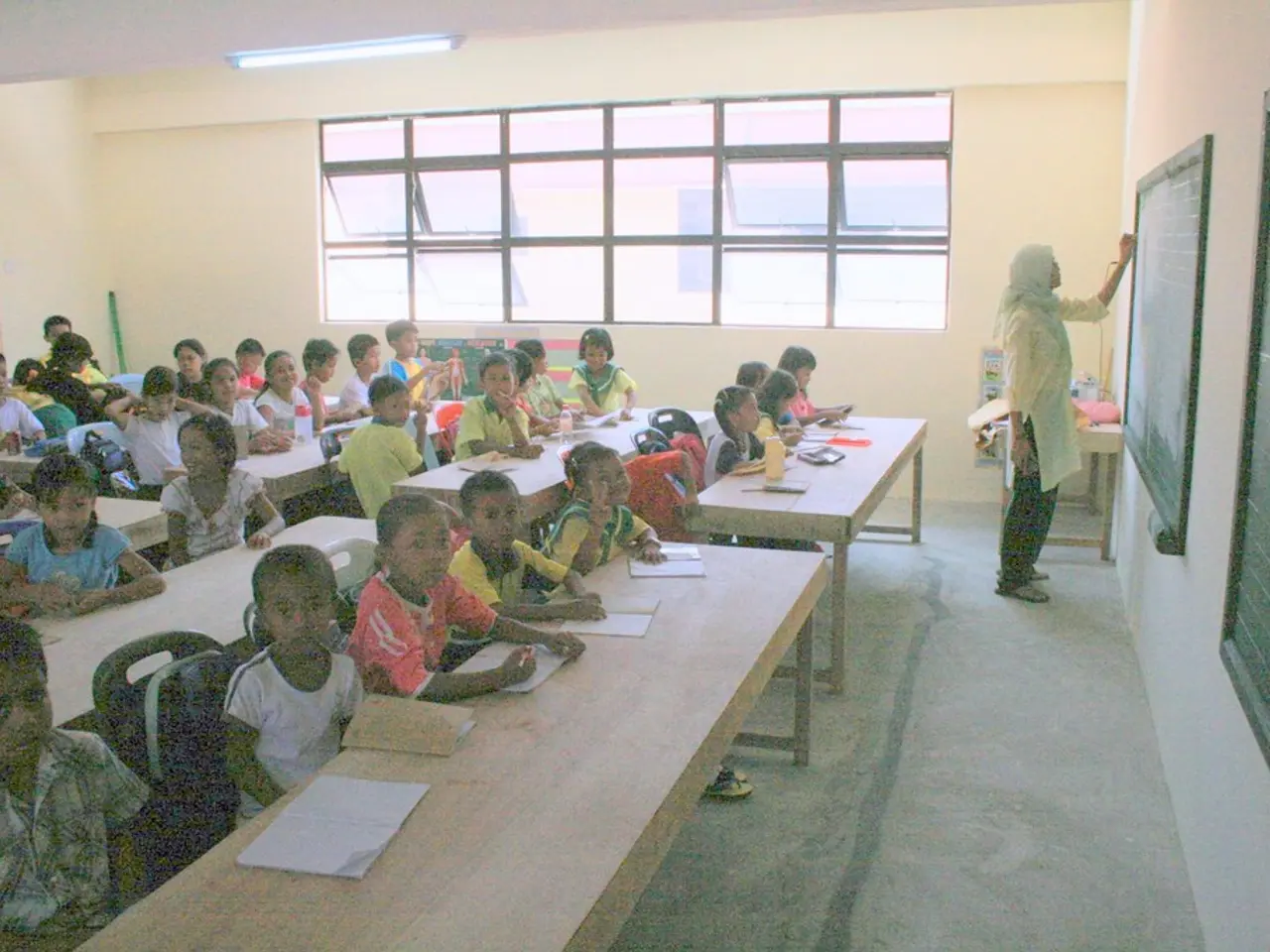AI Gaining Significant Presence in K-12 Education Classrooms According to Stanford Research
In the world of education, the integration of artificial intelligence (AI) is no longer a distant possibility, but a growing reality. A recent study by Stanford University, in collaboration with SchoolAI and OpenAI, sheds light on this trend, revealing that generative AI, such as ChatGPT, is increasingly being adopted in K-12 classrooms across the globe [1][3].
The SCALE study focuses on understanding how these AI tools are being utilised, what drives their usage, and the impact they have on student outcomes, including academic learning and the development of crucial skills like self-regulation and metacognition [1].
Teachers are employing generative AI for a variety of purposes, including:
- Administrative task automation: AI is being used to automate tasks such as grading short answers, compiling reports, and scheduling, freeing up valuable teacher time for instruction and mentorship [4].
- Curriculum development and planning: AI assists in generating dynamic lesson plans, filling gaps aligned with standards, and suggesting pacing adjustments based on data [4].
- Content creation: AI tools like ChatGPT, Canva Magic Write, and Quizlet are being used to create quizzes, presentations, assignments, and lesson plans efficiently [4].
- Supporting students with diverse learning needs: AI's ability to access broad datasets and make individualised recommendations allows teachers to tailor instruction to students' specific challenges in line with Universal Design for Learning (UDL) principles [5].
- Promoting AI literacy and teaching about AI capabilities and ethics: As foundational understanding is necessary for proper and effective use in classrooms, this aspect is also being addressed [2].
The SCALE research underscores that effective AI integration depends on educator expertise and domain knowledge, discipline-specific approaches to AI use, and transparency between students and teachers about AI use [1][2]. The project also stresses the importance of rigorous research to avoid entrenching existing educational problems or creating new ones through AI adoption [1].
The study, conducted by researchers in partnership with SchoolAI, an education technology platform powered by generative AI, found that over 9,000 U.S. teachers used the platform during the first months of the 2024-25 school year [6]. The peak use of the platform occurred during weekday mornings, suggesting that AI is being integrated into active teaching time and lesson preparation [7].
The study grouped teachers into four engagement categories based on activity during a 90-day period. More than 40% of teachers became Regular or Power Users, indicating that AI is becoming part of an ongoing workflow for a significant proportion of teachers [8]. Initially, Regular Users spent more time on student chatbots but shifted to allocating nearly 70% of their time to teacher-support tools [9].
Interestingly, Teacher Chatbot Assistants accounted for 27% of total usage time, while Teacher Productivity Tools accounted for 37% [10]. Student chatbots accounted for 23% of total usage time [11].
Larisa Black, an Earth Science teacher, uses SchoolAI to create specific chatbots for content or standards, finding value in seeing the full conversation and student data [12].
The SCALE Initiative plans to continue tracking usage and researching the impact of AI on student learning [13]. As the extent of generative AI adoption in K-12 schools continues to grow, it is clear that teachers are leveraging it to automate administrative tasks, enhance curriculum and lesson design, support differentiated instruction, and foster deeper learning skills—all while navigating implementation challenges through evidence-based research conducted by SCALE and its partners [1][3][4][5].
Artificial intelligence (AI) in education is being utilised extensively by teachers and educators, as highlighted by the SCALE study. This study demonstrates that AI tools, such as ChatGPT, are being adopted for various purposes in K-12 classrooms, including automating administrative tasks, assisting in curriculum development, content creation, supporting diverse learning needs, and promoting AI literacy.
The integration of technology and artificial-intelligence in education-and-self-development is driven by a growing consensus among educators. The SCALE research underscores the importance of effective AI integration, emphasising the need for educator expertise, discipline-specific approaches, and transparency about AI usage, while also stressing the importance of rigorous research to avoid entrenching or creating new educational problems.




